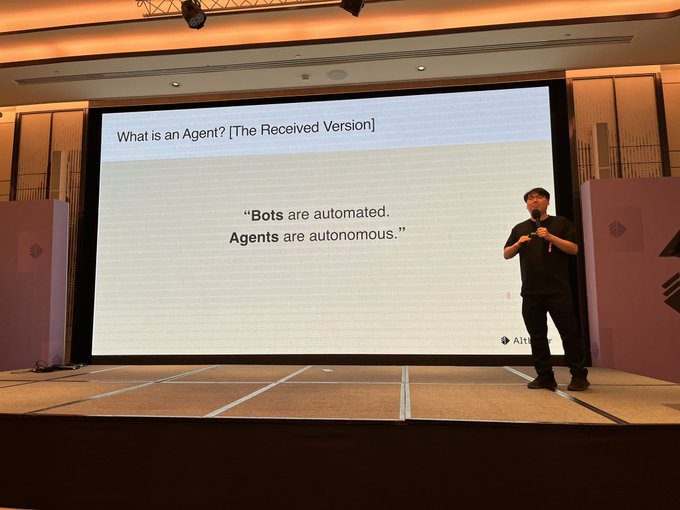Bots are Automated, Agents are Autonomous
The world of AI is rapidly evolving, and with it, the terminology we use to describe various AI-driven entities. A recent tweet succinctly captured a key distinction: “Bots are automated, Agents are autonomous.” This distinction is crucial as it highlights the fundamental difference between traditional bots and the new generation of AI agents.
Bots, or automated programs, are designed to perform specific tasks based on predefined rules and scripts. They are limited in scope and require human intervention for complex decision-making. In contrast, AI agents are autonomous systems capable of perceiving their environment, reasoning about it, making decisions. This autonomy is what sets AI agents apart and makes them a true convergence of AI and crypto technologies.

The Rise of AI Agents
AI agents are becoming increasingly prevalent across various industries, from customer service to IT support and beyond. According to a TechCrunch article, AI agents are intelligent software systems designed to perceive their environment, reason about it, make decisions, and take actions autonomously. These systems incorporate various AI/ML techniques such as natural language processing, machine learning, and computer vision to operate in dynamic domains, autonomously or alongside other agents and human users.
For instance, companies like Asana are leveraging AI agents to assist in task management, helping employees complete tasks with minimal human interaction. Similarly, startups founded by industry veterans are developing AI agents as customer experience tools, capable of solving complex problems that go beyond the capabilities of traditional chatbots.
The Technological Flywheel
Aaron Levie, co-founder and CEO at Box, describes a self-reinforcing flywheel that will dramatically improve what AI agents can accomplish in the near and long-term. This flywheel includes components such as GPU price/performance, model efficiency, model quality and intelligence, AI frameworks, and infrastructure improvements. These advancements will drive the evolution of AI agents, enabling them to perform more complex tasks.
However, MIT robotics pioneer Rodney Brooks cautions that the growth of AI agents may not follow the rapid trajectory of other technologies like Moore’s law for chips. He points out that crossing systems is hard, and some legacy systems lack basic API access, which complicates the integration of AI agents into existing workflows.
AI Agents in Action
David Cushman, a research leader at HFS Research, sees the current crop of AI agents as assistants that help humans complete certain tasks. The challenge lies in helping machines handle contingencies in a truly automated way. While we are not there yet, the industry is making steady progress toward this goal.
Jon Turow, a partner at Madrona Ventures, emphasizes the need for an AI agent infrastructure—a tech stack designed specifically for creating and managing AI agents. This infrastructure will support the development of AI agents and the applications that rely on them, enabling reasoning to gradually improve and frontier models to steer more workflows.
The Future of AI Agents
Fred Havemeyer, head of U.S. AI and software research at Macquarie US Equity Research, believes that the most effective AI agents will likely be multiple collections of different models with a routing layer that sends requests to the most effective agent and model. This approach would resemble an automated supervisor delegating tasks to specialized agents.
Ultimately, the industry is working toward a future where AI agents operate independently, taking abstract goals and reasoning out all the individual steps in between completely autonomously. While we are still in a period of transition, the advancements we have seen so far are promising steps in the right direction.
As AI agents continue to evolve, they hold the potential to revolutionize various industries by automating a wide range of tasks and improving efficiency. However, it is important to recognize that we are not there yet, and further advances and breakthroughs are needed for AI agents to operate as envisioned.
Ready to Transform Your Hotel Experience? Schedule a free demo today
Explore Textify’s AI membership
Explore latest trends with NewsGenie
